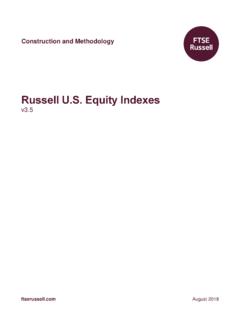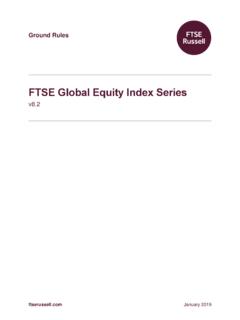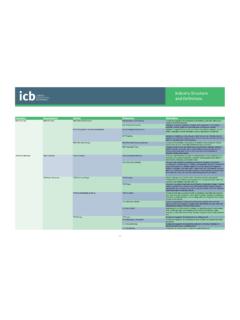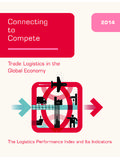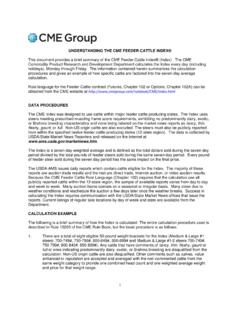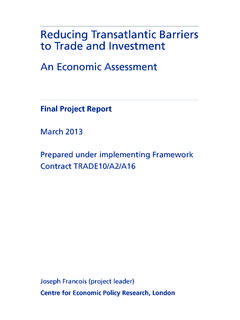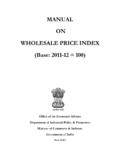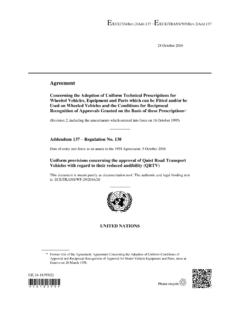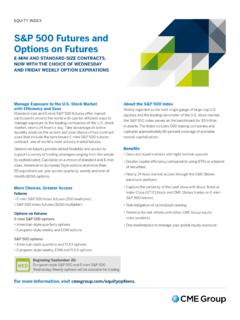Transcription of FTSE Russell Voting Rights Consultation – Next Steps
1 July 2017 FTSE Russell Voting Rights Consultation next Steps FTSE Russell | Voting Rights Consultation next Steps , July 2017 2 Voting Rights Consultation next Steps Introduction FTSE Russell recently consulted index users and other stakeholders on whether FTSE Russell indexes should include a minimum hurdle rate for the percentage of a company s Voting Rights in the hands of non-restricted shareholders. The results of the Consultation showed broad support for the introduction of such a hurdle. A summary of the results from the Consultation is available here.. The main results are provided below: 68% of the respondents agreed that some minimum hurdle for the percentage of Voting Rights in public hands should be imposed.
2 Of the respondents who thought a minimum Voting Rights hurdle was sensible, 23% thought the rate should be set at 5%, and 55% thought it should be set at 25%. Of these respondents, 29% thought that companies that fail to meet the threshold should have all their securities rendered ineligible for index inclusion; 31% thought only their non- Voting securities should be made ineligible, 21% thought that the weight of all the companies securities should be reduced; and 13% thought that non- Voting securities should be ineligible and the weight of Voting securities reduced. For potential new constituents, 83% of those respondents who agreed with a minimum Voting Rights hurdle thought the restriction should remain in place until such time as the company s capital structure becomes compliant.
3 For existing constituents, 32% of those respondents who agreed with a minimum Voting Rights hurdle thought the restrictions should apply immediately; 60% thought there should be a grandfathering period lasting from three to seven years before the eligibility hurdle was applied. There was strong support for FTSE Russell global indexes (88%) and Russell US indexes (77%) to follow the proposal. These results were discussed at FTSE Russell s external advisory committees and as a result of those discussions FTSE Russell has developed the following proposal. FTSE Russell | Voting Rights Consultation next Steps , July 2017 3 Proposal In the light of the Consultation results, FTSE Russell proposes to proceed as follows: Developed market constituents of all FTSE Russell indexes will in future be required to have greater than 5% of the company s Voting Rights (aggregated across all of its equity securities, including, where identifiable, those that are not listed or trading) in the hands of unrestricted (free-float) shareholders as defined by FTSE Russell .
4 The hurdle will apply to all standard FTSE Russell indexes, including the Russell US indexes, FTSE Global Equity index Series (GEIS) and non-cap weighted indexes including the FTSE and Russell RAFITM index Series and factor indexes. It will also apply to the FTSE UK index Series; however its application there is likely to have minimal effect given that constituents of that index are already required to have a minimum free float of 25% for UK incorporated companies, or 50% for non-UK incorporated companies. Companies that have 5% or less of their Voting Rights in the hands of unrestricted shareholders will have their securities rendered ineligible for index inclusion.
5 For potential new constituents, including IPOs, the rule will apply with effect from the September semi-annual and quarterly reviews. For existing constituents, the rule will apply with effect from September 2022, thus affording a five-year grandfathering period to allow constituent companies to change their capital structure if they so wish. The rate at which the hurdle is set, along with its definition, will be reviewed in the light of subsequent developments on an annual basis. If, following an annual review, FTSE Russell should determine that a more restrictive threshold would be appropriate, the grace period will be extended by a further year. FTSE Russell | Voting Rights Consultation next Steps , July 2017 4 Rationale for the Proposal The results of the Consultation showed broad support for the introduction of a Voting Rights threshold.
6 However, a significant minority of respondents argued that no such eligibility criterion was necessary. These respondents argued that the role of an index provider was to reflect the investable universe, and not to require minimum governance standards from constituent companies, at least not in standard, as distinct from ESG, indexes. One respondent presented an academic paper that argued that the issue price of an IPO would reflect the economic value of any loss of Voting Rights . The inclusion of such an eligibility hurdle might in addition discourage future tech IPOs should companies prefer to stay private rather than lose a degree of control; this would reduce the opportunity set for investors in public markets.
7 Against this it was argued that without the imposition of a hurdle, future tech IPOs in the US would have little incentive to offer Voting Rights to public shareholders. There were two broad types of response with respect to the appropriate size of the threshold for Voting Rights . Some 23% were in favour of a 5% threshold; this would be consistent with the current minimum free float for most FTSE Russell indexes. However, 55% were in favour of a higher 25% threshold, consistent with the minimum free float requirement for eligibility to the FTSE UK index Series. The results of an indicative analysis of the impact of applying 5% and 25% Voting Rights hurdles is provided here.
8 Further analysis of the responses suggests that those in favour of a 25% hurdle were predominantly users of the FTSE UK Series where a minimum free float threshold of 25% already applies. Although FTSE Russell recognises the desire of these users to extend the standards embedded in the UK index Series more widely, we consider that the application of a 25% threshold would be unduly disruptive to global indexes. In contrast, a 5% hurdle would have a limited, but non-zero, impact. FTSE Russell is therefore minded to impose a 5% hurdle in the first instance but to review the threshold on an annual basis in case subsequent events might lead it to conclude that a higher threshold would be more appropriate.
9 With regard to whether the hurdle should apply to all constituents or to only a subset, FTSE Russell considers that it should apply only to constituents from developed markets, at least in the first instance. Under the FTSE Russell country classification scheme, emerging markets are not expected to meet the same criteria as developed markets; it might be considered unreasonable to hold constituent companies to the same standards as their developed market peers. Further, foreign ownership restrictions are not uncommon in emerging markets. In some countries these can be overcome through the purchase of non- Voting securities. For example, FTSE GEIS includes Thai Non- Voting Depositary Receipts in addition to Thai local shares.
10 Additional support for the exclusion of emerging markets from the Voting hurdle requirement is provided by the recent willingness of FTSE Russell index users to allow the inclusion of securities from Variable Interest Entity structures such as Alibaba and Baidu to FTSE GEIS with effect from September 2017. The publicly available securities of these entities trade in the US, but although the US securities themselves have substantial Voting Rights in public hands, investors in the US securities have no direct control of the local operating companies. Instead, there are contractual arrangements to bind the US entities to the local operating companies. As happened in the case of Alipay, there is the possibility that these contractual links can be broken.

